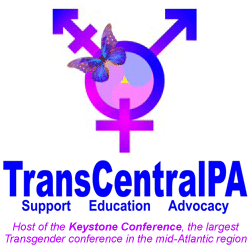The Peach State Conference
I attended the Peach State Conference last week and wanted to share my experiences and thoughts about it. It was not your average conference. What emerged was a group of transgender people and allies committed to address the serious local issues of being transgender. Since all local issues are also national issues, the hope is that other local groups can benefit from lessons learned. First a divertissement.
 When I first came to Georgia, I started looking for the peach orchards that I expected to dominate the economy. Finding none, I started to make inquiries. Turns out all of the peach growing mainly occurs in South Carolina as the big peach-shaped water tower in Gaffney, South Carolina along I-85 symbolizes. I continued to look for the sources of the Georgia economic activity and had some surprises. Turns out that the biggest center for economic activity is Hartsfield-Jackson Atlanta Airport and its associated businesses. That made some sense since in order to fly people or goods to most anywhere in the South one has to go through that airport. But I was surprised to find the next biggest industry was chicken farming. So I guess Georgia continues to be the Peach State because they do not want to be known either as the airport or chicken state. The South Carolinian peach growers must not mind because Georgia is a good market for them.
When I first came to Georgia, I started looking for the peach orchards that I expected to dominate the economy. Finding none, I started to make inquiries. Turns out all of the peach growing mainly occurs in South Carolina as the big peach-shaped water tower in Gaffney, South Carolina along I-85 symbolizes. I continued to look for the sources of the Georgia economic activity and had some surprises. Turns out that the biggest center for economic activity is Hartsfield-Jackson Atlanta Airport and its associated businesses. That made some sense since in order to fly people or goods to most anywhere in the South one has to go through that airport. But I was surprised to find the next biggest industry was chicken farming. So I guess Georgia continues to be the Peach State because they do not want to be known either as the airport or chicken state. The South Carolinian peach growers must not mind because Georgia is a good market for them.
You are probably all aware that Southern Comfort was in Atlanta for many years but moved to Florida this year. This left the many local Atlanta SCC volunteers without a conference to host and they began to question their purpose. They found a new purpose of improving life for transgender as well as LGBQQIA people starting at the local level. In the process they discovered existing local assets and initiatives. No use feeling bad that SCC had left town, they discovered that there was too much to do. I did not meet one person at the conference who seriously held a grudge for SCC. They were all too busy
Consistent with the maxim, “First preserve life,” the first group up was the Solutions Not Punishment Coalition (SNPC). I met most of these folks last year when the homeowners association in my Atlanta district wanted the city to banish transgender prostitutes working in the area. Banishment means legally forbidding them to return. In case you were wondering, banishment is unconstitutional. The mayor called a task force to consider this proposal and eventually it lost steam. But the impetus for diversion from arrest to providing social services and housing still exists. While these folks continue to push for diversion, they are also taking direct action to deal with harassment and violence toward transgender people. Police had been harassing transgender drivers in a small suburban Atlanta town but the SNPC sat down with the mayor and police chief and got them to establish a standard operation procedure document and training for the police to treat transgender people fairly. They have also been picketing MARTA, the local subway, to improve security on trains. There have been a rash of attacks against trans people on them.
Next up was a group that is trying to establish a gender clinic at Emory University Healthcare. They are taking baby steps right now but are already prescribing hormones and prescribing puberty blockers for kids. After the Johns Hopkins fiasco with McHugh (he was brought in to kill their gender clinic), it is good to see that university health centers are getting back into the game.
The Atlanta police GLBT liaison officer provided a good session on community and cyber security. He greeted me by my first name and it surprised me that he would bother to remember me from previous encounters. I grilled him on the aborted DOJ police training initiative to train local police how to treat transgender people and got all my questions answered. This is something neither than the DOJ Community Relations Bureau, nor my City Councilman nor our Washington, D.C. advocates could answer. The course was evidently cancelled because local police wanted to integrate their own courseware into their normal training rotation. He talked about cyber security and an app called “Circle of Six” which allows a person to notify six of their friends if they felt danger. I hope to try it.
The Health Care Initiative located in the Rush LGBT Center in Atlanta provided a good run down of the ACA and other healthcare options for transgender people. I grilled them on when transgender-specific Medicare coverage would be available and they gave me a valuable referral.
The Trans-Housing of Atlanta Program (THAP) is seeking to get shelter for trans people in both the short and long term. The short term shelters here do not welcome transgender people and force them to change their gender presentation according to what the shelter people think it should be. Short term, THAP is setting up shelters and, long term, intends to provide poor transgender people with homes so that they can more easily get jobs. They seem to be making progress.
The conference had a panel of local therapists and a doctor to answer any questions the attendees. So I took advantage of this session. I told the doctor about the problems I had getting a mammogram at his hospital. He wanted to know about the social and financial problems so that he can get them solved. As for the therapists, they have all started using the ICD billing codes which means that the DSM is dead. It also means that we are continue to be pathologized because the ICD uses gender identity disorder as a code. I also tried to get a discussion about whether a counselor could be simultaneously a gatekeeper and a therapist because a transgender person might not want to tell them about an issue that would prevent authorization letters. They seemed to think that this was not an issue but I did not get what I thought was a satisfactory reason why.
The universities in Georgia have started a historical archives project for LGBT information and they are urgently seeking historical information on transgender people in the state. Representatives came to the conference in search of people that might be able to donate files or give oral interviews. The next session was right in line with the archivist one. Dallas Denny gave a talk about transgender history in Atlanta. All agreed that she should be one of the first people from whom the archivists should seek information.
Finally, I went to a side meeting billed as “professionals meeting” and figured that if they did not want scientists there, I could leave gracefully. To my surprise, I was welcomed by the nurses, therapists, transgender people and doctors there who want to start a research initiative on transgender topics. This group represents all of the concerned people needed to do some good research and it will allow me to get a board set up to vouch for my research according to Federal law.
In conclusion, the Peach State Conference was not just your average get together. I believe that the people and groups who attended can make some real progress on transgender issues right here in Atlanta.
Category: Transgender Community News, Transgender Opinion










